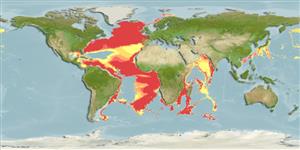Classification / Names
Κοινά ονόματα | Συνώνυμα | Catalog of Fishes(Γένος, Είδη) | ITIS | CoL | WoRMS | Cloffa
>
Lophiiformes (Anglerfishes) >
Himantolophidae (Footballfishes)
Etymology: Himantolophus: Greek, himas or himantos = leather strap, thong or leash (referring to the thick leathery illicium) + Greek, lopho or lophio = crest or tuft (referring to the baited illicium projecting from the head) (Ref. 86949).
Environment: milieu / climate zone / depth range / distribution range
Οικολογία
Θαλασσινό(ά) βαθυπελαγικό(ς); εύρος βάθους 360 - 880 m (Ref. 86949). Deep-water
Western Central Atlantic: off the east coast of Florida and in the eastern Gulf of Mexico.
Pacific Ocean: Taiwan (Ref. 122006).
Μέγεθος / Βάρος / Age
Maturity: Lm ? range ? - ? cm
Max length : 15.0 cm SL (female)
Short description
Κλείδες προσδιορισμού | Μορφολογία | Μορφομετρία
Ραχιαίες άκανθες (συνολικά) : 0; Μαλακές ραχιαίες ακτίνες (συνολικά) : 5; Εδρικές άκανθες: 0; Μαλακές εδρικές ακτίνες: 4. Distinguishing characteristics of metamorphosed female: length of illicium 40-41% SL in specimens 8.2-9.4 cm, 23% SL in 3.5 cm specimens; each primary branch of posterior escal appendage bifurcating once or twice to form 2-5 slender branches, total length 11-13% SL; stem and base of illicium with 5-7 appendages, longest 5.7-12% SL (Ref. 86949).
Life cycle and mating behavior
Γεννητική Ωρίμανση | Αναπαραγωγή | Γεννοβολία | Αβγά | Γονιμότητα | Προνύμφες
McEachran, J.D. and J.D. Fechhelm, 1998. Fishes of the Gulf of Mexico. Volume 1: Myxiniformes to Gasterosteiformes. University of Texas Press, Austin. 1112p. (Ref. 37039)
IUCN Red List Status (Ref. 130435: Version 2024-2)
Threat to humans
Harmless
Human uses
Εργαλεία
Special reports
Download XML
Διαδικτυακές πηγές
Estimates based on models
Preferred temperature (Ref.
123201): 6.1 - 11.6, mean 9.4 °C (based on 133 cells).
Phylogenetic diversity index (Ref.
82804): PD
50 = 0.5000 [Uniqueness, from 0.5 = low to 2.0 = high].
Bayesian length-weight: a=0.01995 (0.00906 - 0.04395), b=3.01 (2.83 - 3.19), in cm total length, based on all LWR estimates for this body shape (Ref.
93245).
Τροφικό Επίπεδο (Ref.
69278): 4.2 ±0.7 se; based on size and trophs of closest relatives
Fishing Vulnerability (Ref.
59153): Low vulnerability (10 of 100).
